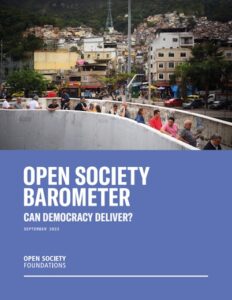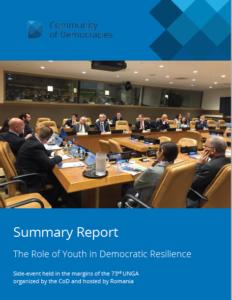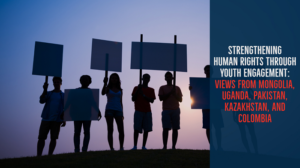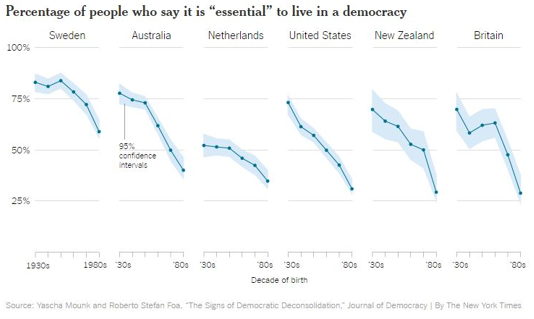 A sobering and alarming survey reveals that democracy remains popular across the world, but young people are far less likely than their elders to believe it can deliver on what concerns them, The Guardian reports:
A sobering and alarming survey reveals that democracy remains popular across the world, but young people are far less likely than their elders to believe it can deliver on what concerns them, The Guardian reports:
- According to a major international survey of 30 countries published on Tuesday, 86% of respondents would prefer to live in a democratic state and only 20% believe authoritarian regimes are more capable of delivering “what citizens want”.
- However, only 57% of respondents aged 18 to 35 felt democracy was preferable to any other form of government, against 71% of those over 56, and 42% of younger people said they were supportive of military rule, against just 20% of older respondents.
- The report, by Open Society Foundations (OSF), the civil society donor network funded by the billionaire philanthropist George Soros, also found that more than a third (35%) of young people felt a “strong leader” who did not hold elections or consult parliament was “a good way to run a country”.
The report, Open Society Barometer: Can Democracy Deliver?, finds that the concept of democracy remains widely popular across every region of the globe, with 86 percent saying that they would prefer to live in a democratic state, OSF adds. There is also widespread disbelief that authoritarian states can deliver more effectively than democracies on priorities both nationally and in global forums. Topping the list of such priorities, people worry most about poverty and inequality (20 percent), climate change (20 percent), and corruption (18 percent).
The findings include:
- People support democracy. Only 20 percent consider authoritarian countries more capable than democracies of delivering “what citizens want.” At the international level, two-thirds (66 percent) of respondents feel that democracies contribute more to global cooperation. Respondents also believe firmly in human rights, with an overwhelming 95 percent rejecting the idea that it’s OK for governments to violate the rights of those who look different from themselves. Countries across every region, income level, and current type of governance maintained strong levels of support.
 A large minority of young people surveyed (42 percent) feel that military rule is a good way of running a country. A similar number (35 percent) feel that having a strong leader who does not bother with elections or consulting legislatures is a good way of running a country. This compares to 20 percent that support military rule and 26 percent that are in favor of a strong leader in the 56 and above age bracket.
A large minority of young people surveyed (42 percent) feel that military rule is a good way of running a country. A similar number (35 percent) feel that having a strong leader who does not bother with elections or consulting legislatures is a good way of running a country. This compares to 20 percent that support military rule and 26 percent that are in favor of a strong leader in the 56 and above age bracket.- Majorities in 21 of the countries polled fear that political unrest could lead to violence in the next year. Large majorities in some high-income countries also share this worry, including two-thirds of respondents in the United States and France. Forty-two percent of respondents believe the laws of their country do not keep people like them safe.
- Half of respondents (49 percent) say they have struggled to feed themselves at least once in the last year—a number that holds in states as dissimilar as Bangladesh and the United States.
- The climate crisis is a high priority for citizens across low-, middle-, and high-income countries. Seventy percent of those surveyed expressed anxiety that climate change will personally affect respondents and their livelihoods in the next year.
- Across the globe, corruption is considered the chief concern for people at a national level—with an average of 23 percent saying it is the most important issue facing their country. Countries in Africa and Latin America expressed far greater concern, in stark contrast with Western Europe.
 Poverty and inequality rank the highest (21 percent) among the issues that most directly impact people personally. This holds true in Senegal (the smallest economy surveyed) as well as the United States (the largest). Moreover, a majority (69 percent) believe that economic inequality between countries is a bigger challenge this year than last. This is most keenly felt in Africa, Latin America, and the Middle East.
Poverty and inequality rank the highest (21 percent) among the issues that most directly impact people personally. This holds true in Senegal (the smallest economy surveyed) as well as the United States (the largest). Moreover, a majority (69 percent) believe that economic inequality between countries is a bigger challenge this year than last. This is most keenly felt in Africa, Latin America, and the Middle East.- A plurality of respondents believe China’s growing influence will be a force for good—nearly twice as many respondents believe this will have a positive impact (45 percent) on their country as a negative one (25 percent). However, there is a sharp contrast between the enthusiasm of lower-income countries and the overwhelming negativity of high-income democracies, where only small minorities register positivity about the rise of China
- People believe that a fairer international system would be more effective. Sixty-one percent of those surveyed believe low-income countries should have a greater say in global decision-making—though, predictably, lower-income regions were more enthusiastic than Europe and the United States on this front.
“Our findings are both sobering and alarming,” said Mark Malloch Brown, OSF’s president and a former UN deputy secretary general. “People around the world still want to believe in democracy, but generation by generation that faith is fading as doubts grow about its ability to deliver concrete changes to their lives.”








